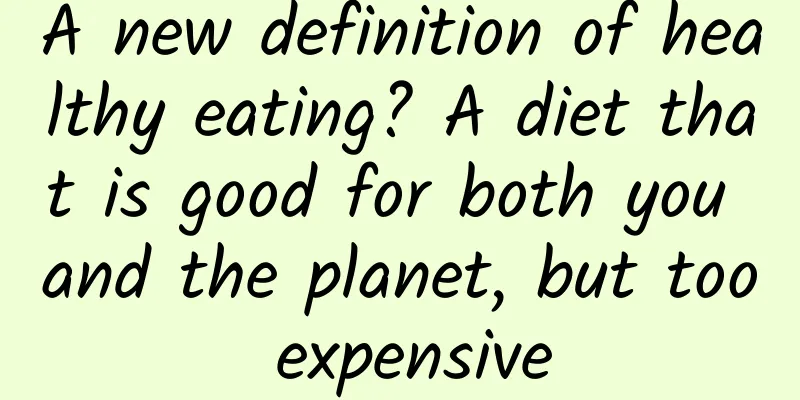A new definition of healthy eating? A diet that is good for both you and the planet, but too expensive

|
How can we eat to keep ourselves healthy while protecting the earth? In 2017, unhealthy diet caused more deaths worldwide than any other cause, including smoking. As the world's population continues to grow and more people adopt a Western diet, demand for meat, dairy products and eggs will increase by about 44% by 2050, according to the Food and Agriculture Organization of the United Nations (FAO). Today, more than 2 billion people in the world are overweight or obese, most of them concentrated in Western countries. At the same time, 811 million people do not get enough calories or nutrients, mostly in low- and middle-income countries. Rich people eat too well, while poor people can’t eat enough! Such a diet brings a series of problems to the earth's environment and human health. 1. A quarter of the world’s greenhouse gas emissions come from our industrialized food system 2. It accounts for 70% of fresh water use and 40% of land use. 3. The dependence and use of chemical fertilizers is also destroying the natural nitrogen and phosphorus cycle, leading to the pollution of most rivers and coasts. 4. Changes in global urbanization and population growth will cause food-related greenhouse gas emissions to surge by 80% between 2010 and 2050. Some estimate that if everyone on the planet eats a more plant-based diet and all other sources of greenhouse gas emissions are halted, the world would have a 50% chance of achieving the 1.5°C climate change goal set out in the Paris Agreement. If dietary changes are accompanied by broader food system changes, such as reducing food waste and eating clean, the chance of achieving this goal rises to 67%. To this end, in 2019, a coalition of 37 nutritionists, ecologists and other experts from 16 countries (EAT-Lancet Food, Planet and Health Commission) released a dietary strategy: A healthy diet consists of eating plant foods most of the time and occasionally eating small amounts of meat or fish. See the picture for details. This strategy can meet human nutritional needs while taking into account the earth's environment. People who follow the EAT-Lancet diet are called "flexitarians." For an average-weight, 30-year-old person on a 2,500-calorie-a-day diet, that means they can only eat 100 grams (or one serving) of red meat per week. That's less than a quarter of the typical American's weekly red meat consumption. Ultra-processed foods, such as soft drinks, frozen meals and reconstituted meats, sugars and fats should be avoided as much as possible. In fact, this dietary pattern is very suitable for wealthy countries, where the per capita meat intake is 2.6 times that of low-income countries. It is obvious that such dietary habits are not sustainable. Although it looks good, the average price of such nutritious food is about $2.84 per meal worldwide, and even $10 in the United States. For poor countries, such a diet is a bit expensive. It is estimated that this dietary strategy will indirectly save about 11 million lives each year. Unfortunately, most consumers do not follow dietary guidelines! For your own health and for the sake of the planet, would you follow this diet? What humanity should eat to stay healthy and save the planet doi: 10.1038/d41586-021-03565-5 |
>>: Why was Chang'an, the ancient capital of 13 dynasties, renamed Xi'an?
Recommend
Analysis of 10 high-conversion detail page cases on 3 major traffic platforms!
At present, there are already many articles on th...
A thorough explanation of the product logic behind the lucky draw
I just recently completed a lottery project, and ...
The cold wave is coming, what does a double La Niña year mean?
According to the National Climate Center on Octob...
You may not know it, but you have eaten the candied haws made from it.
Today we are going to talk about the outdated fru...
C4D+AE+Redshift rendering Star Beauty advanced real scene synthesis full process 2020 [HD quality with material]
C4D+AE+Redshift rendering Star Beauty advanced re...
How do SEM bidders respond to company interview questions? A collection of interview secrets!
I believe that every SEMer works hard to optimize...
Analyst: Apple may be late or even miss the automotive feast
Apple Inc. (AAPL) recently acquired a number of c...
It's so magical! This car takes in "it" and discharges pure water?
Expert of this article: Qi Liya, PhD from Peking ...
Why is Lei Jun so busy with Xiaomi NOTE?
[[133904]] Have you noticed? Many of Xiaomi’s law...
16 types of cheese sticks for children tested: high in sugar and fat, not recommended for consumption
Have you ever bought cheese sticks for your kids?...
Small and powerful handheld game console - Samsung GALAXY A3009
Although large-screen mobile phones are a popular...
Is there a "sea" in the vast Gobi Desert? It is an "energy supply station" for migratory birds!
In Fuhai County in Altay Prefecture in northern X...
Meituan APP product analysis report: Strengthen guidance on user decision-making!
1. Introduction 1. Background 2. Experience the e...
Why is it said that home appliance companies investing in sports is equivalent to investing in real estate?
On January 14, Hisense announced that it would be...









